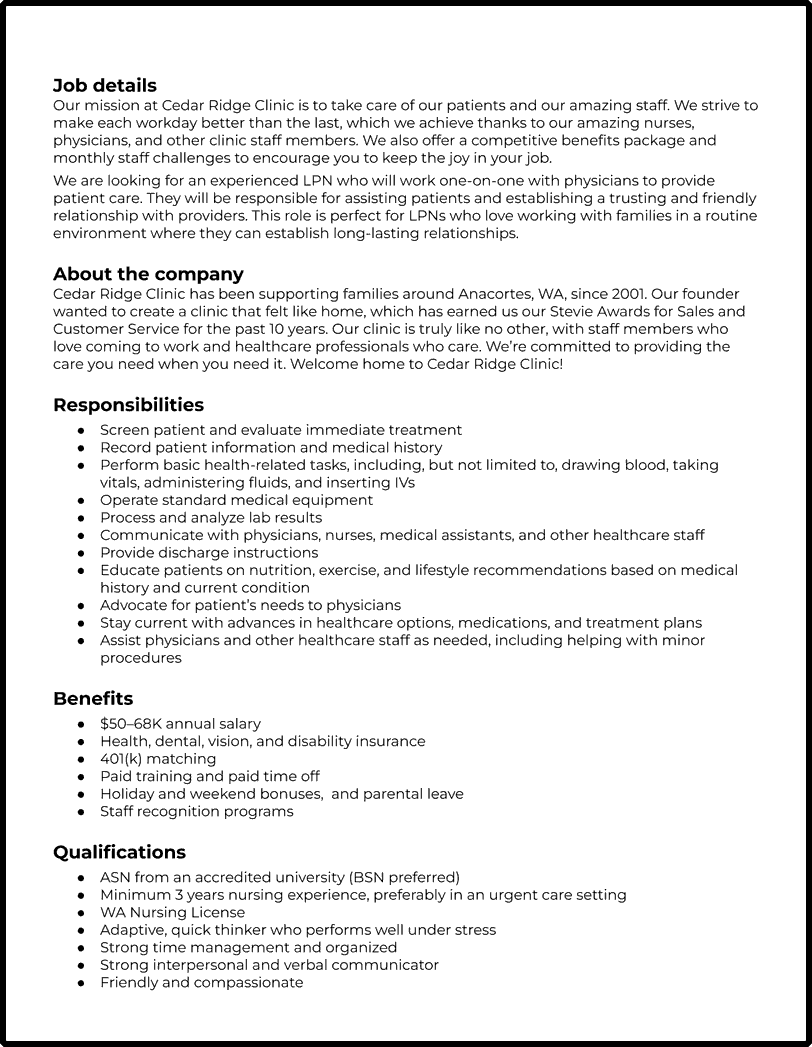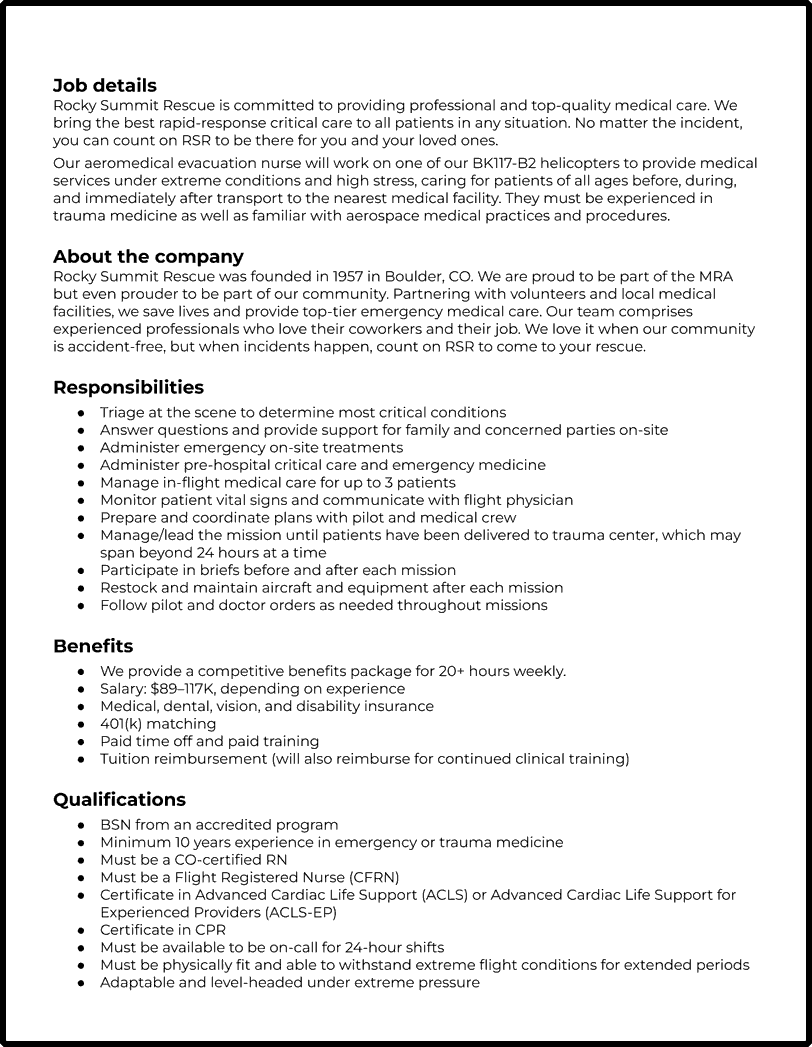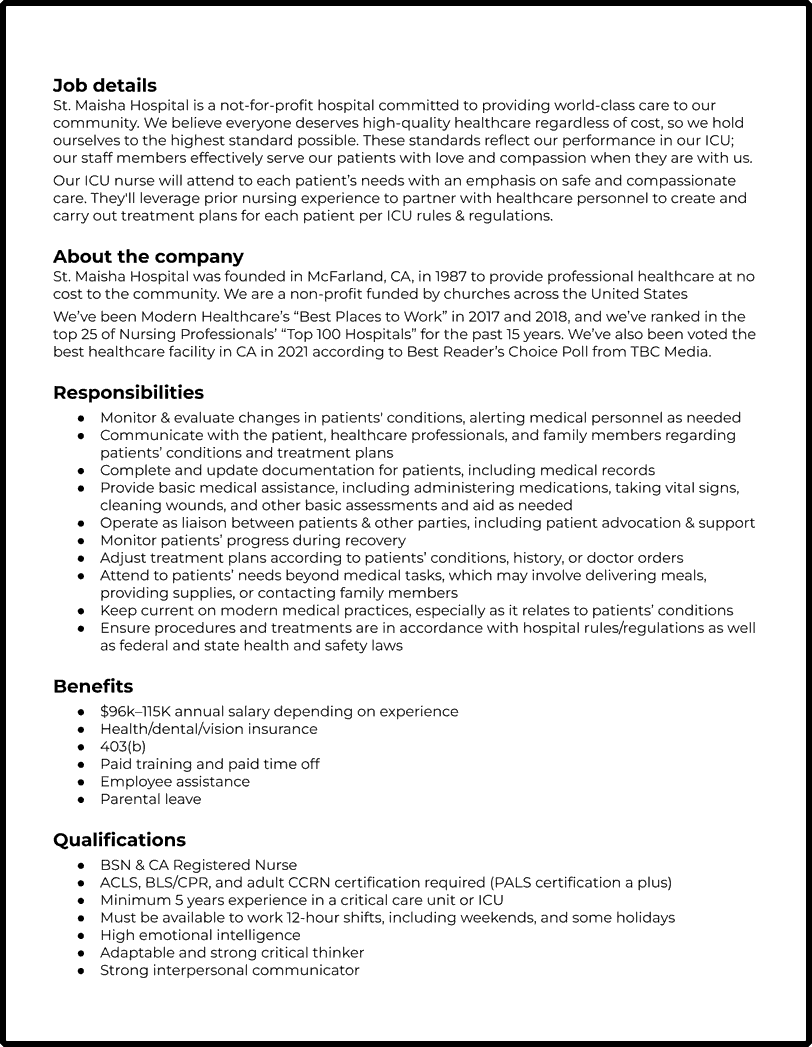A nurse’s job isn’t all hugs and smiles—they must provide life-saving aid and work under adverse conditions and long hours. They must always maintain professionalism, even hiding tears when patients breathe their last. It’s a heavy burden that nurses endure, exemplifying their dedication to their community.
We know that hiring nurses can sometimes feel as taxing as the graveyard shift at the ER, which is why we’ve created this extensive guide to help you write the best job description and find the most qualified nursing staff for your healthcare facility and needs.
Why this job description works
- Opening a general nursing job description with your mission statement is catchy and effective. It shows potential candidates what you’re all about and gives them a quick peek into the work atmosphere.
- Demonstrating that you value your employees as much as you value your patients will have your next hire polishing up their nursing resumes right away!
- Attract compassionate, bright hires by emphasizing and showing those qualities in your own writing tone.
- Mention standout benefits like staff recognition programs alongside essentials like healthcare and paid time off, but order them thoughtfully.
- Listing common benefits like insurance first and then ending with something unique like staff recognition will provide a perfect transition to your closing paragraph!
- Reiterating your workplace environment can also help applicants pick which resume template styles to use, allowing you to further gauge whether they’re really in sync with your work culture .
Why this job description works
- If you’re writing a registered nurse job description for a more intense role that involves high-stress situations like emergency trauma care via helicopter, then say so right away! Always clearly state the stress levels and physical demands of your work environment.
- Addressing the intensity level of the job will help applicants choose their most informative experience for their registered nurse resume. You don’t want to hire someone who isn’t cut out for the role.
- Even when you’re looking to fill a role that focuses primarily on technical abilities, include a couple of soft skills to convey the pace of the job.
- The ratio of hard vs. soft skills in your job description should be mirrored in a candidate’s resume. If their balance doesn’t match yours, pay attention!
Why this job description works
- While filling in the qualifications section in your ICU nurse job description, always mention any long or unusual shifts you may require. Some people simply can’t perform at their best during the graveyard shift, so always mention 12-hour shifts, overnights, or any other outliers that applicants should be prepared for.
- Look for examples that match your qualifications list: An ICU nurse resume should demonstrate their ability to tackle difficult situations and long hours.
- Give clear examples of what your hire might encounter, even when you’re looking for an experienced individual.
- Outline advanced and basic duties that your ICU nurse will perform. An applicant’s resume objective should quickly show how well they’d fit in.
Write a Nursing Job Description to Attract Quality

Imagine trying to care for a patient when the only instruction you’re given is to “take care of patients.” It sounds nice—until you realize you have no idea what that means. What’s wrong with the patient, what equipment and resources are at your disposal, and what has been done for their care in the past?
Unfortunately, most nursing job descriptions are sparse and vague. They don’t explain the specifics of the job or why the organization is hiring in the first place. Since your job description is your first interaction with your new nurse, it’s important to get it right. Take the time for due diligence, and give the right information in the right dosage.
Give the right information from the start
One of the cornerstones of good job descriptions is specificity, especially when it comes to why you’re hiring. Don’t write a one-sentence nursing job description. (And yes, we have seen this!)
Get to the heart of the issue instead. Is the ER short-staffed during the night shift? Do you have a specialized clinic and require an RN to work with patients daily? Does your hospital have a temporary need for an ICU nurse? Give nurses context, so they know what they’re up against.
Write your job description one step at a time
You’ve got your reason for hiring and the general guideline of specificity. Now what? Follow a nurse’s example, and take the process one step at a time in the proper order.
The first step is getting words on the page. Start with one section at a time, beginning wherever you’re most familiar. Jot down the bare minimum until you have a solid outline. Then circle back and continue adding details to each section until it’s complete.
Keep in mind, “complete” doesn’t mean “long.” Your job description should neither be just a paragraph nor pages and pages long. Just like how too much medicine is a disaster waiting to happen, too much information can ward off applicants, so give only the information your new nurse needs.
Revise your nursing job description
You have the essentials—now it’s time to make it shine. Eliminate anything irrelevant, and replace vague statements with concrete information. Nurses pay strict attention to details, so your details should be unique, accurate, and honest.
You should also examine your tone. Nurses are honest and empathetic, which should be reflected in your job description. Being overly formal will only turn away applicants since it can come across as uncaring and sterile.
After content revision, send out your job description for feedback. Healthcare professionals often seek second opinions, so you should, too. Have a few coworkers read through it, and if you can, ask the opinion of a few nurses who work in the department of your future new nurse. Have them think critically about readability, content, and flow.
With constructive criticism in hand, make the needed edits. Then, just as nurses customize their treatment for each patient, tailor your formatting so your job description looks attractive and professional on every job board.
All that’s left is to hit “submit” and celebrate—you’re that much closer to hiring! Soon enough, you’ll have a stack of nurse resumes awaiting your perusal.
Start with a Skeleton of Your Nursing Job Description

Hard time organizing your thoughts? Use the outline below to structure your nursing job description to include everything you need.

Job details
Also called an introduction or summary, this is where you’ll give context: what healthcare organization you work for, why you’re hiring, and whom you’ll be hiring. Be brief and concise.

About the company
Here’s where you can describe more about your organization, but don’t overdo it. Anything longer than two quick paragraphs is overkill. Future nurses do need to know the culture of your institution, but they don’t need to know your whole history at this exact time. Always remember you’re writing this job description for the applicant’s benefit, not to sound perfect for the press or public relations.

What you’ll be doing
Just like drugs have names aplenty, this section can be called many things but will always have the same goal: telling the applicant what they’ll do on the job. Although nurses complete many tasks in a day, you don’t have to list them all. Some responsibilities can be lumped together in umbrella statements.
Just don’t rely too heavily on experience to summarize the requirements. Only listing “2 years experience as an RN” is lazy, unprofessional, and not helpful in providing a complete picture of your needs. If you’re fumbling to hit a balance between general and specific, take a look at some of our examples below.
- Package patients for transport
- Administer pre-hospital critical care and emergency medicine
- Process and analyze lab results

Qualifications
Nursing can be a very niche field with positions for every healthcare concern imaginable: forensic nurses, geriatric nurses, nurse educators, clinical nurse midwives, and more. Each position requires different experience and certifications, so don’t skimp on qualifications. Nurses need to know exactly what’s needed for the specific role—no more, no less.
- BSN from an accredited program
- Minimum 10 years experience in med-surg facility
- Adaptive, quick thinker who performs well under stress

Benefits
Nursing can be an extremely unforgiving job, but adding a benefits section reassures your future nurses they’ll be looked after just as well as their patients. When listing a salary (or hourly pay), use a range, as it allows you flexibility based on your new hire’s experience and credentials.
The Many Duties and Functions of a Nurse

In a single day, nurses may wipe tears, administer pain medication, take measurements, comfort families, recommend tests, consult physicians, set up or clean treatment rooms, fetch items, and far more. They’re educators, healers, comforters, cleaners—the seemingly tireless who always have a smile. Nursing isn’t for the faint of heart or body.
If you need inspiration for what to include in your nursing job description, check out the functions below to get an idea of what nurses do daily. Not all nurses will take on all of these roles, but it’s a good way to get started (and, hey, if you’re in healthcare, this is a good list to inspire your nurse cover letter).

Educator
- Nurses not only have to do the job, but they also have to explain it. Nurses are there to tell patients about their treatment plans, and discharge instructions, and answer any questions the patients have. If you need answers, nurses have them (or can get them).
- Answer patient questions regarding treatments, inform families and patients about treatment plans in a timely and friendly manner and demonstrate steps for patient care to patients and families through multisensory learning.
- Promote a healthy lifestyle for patients by explaining the necessity of proper nutrition, exercise, medication, and recommended treatment.
- This role will require flexibility and competent interpersonal, written, and verbal communication. Must be able to communicate with a variety of audiences regarding complex medical matters.

Communicator
- Communication is the heart of a nurse’s job. They talk to patients, relay information to doctors, trade ideas with fellow nurses, and share updates with families. Interpersonal communication is vital, but incredibly so when you consider the critical and sensitive information nurses handle daily. One misplaced word can result in dangerous consequences, so nurses must be clear communicators.
- Establish rapport with patients and families immediately, record medical histories/symptoms/treatment plans, and discuss patient care with fellow nurses and doctors.
- This role will require strong written, verbal, and interpersonal communication. Strong critical thinking skills and adaptability are also non-negotiable.

Counselor
- We’ve said it before, but we’ll say it again: nurses are excellent counselors. They are the ones who interact the most with patients, so they see the wide cycle of emotions their patients experience. Nurses can be counted on to have a spare tissue, a sunny disposition, or a word of sympathy for those who need it most.
- Provide emotional support to patients with a friendly, calm attitude, actively listen to patients’ concerns, and guide patients to desired emotional and behavioral outcomes through logical and compassionate reasoning, teaching, and demonstration.
- This role will require strong interpersonal communication, compassion, empathy, adaptability, and resilience.

Patient advocate
- Obviously, nurses exist to help their patients, which means they have to support their patients. This may mean adjusting a treatment plan based on the patient’s progression or regression, advocating for more resources, removing barriers to care, explaining treatments, and collaborating with others to make sure patients have all they need.
- Establish professional relationships with patients through consistent, kind, and effective communication and care, answer questions, and provide education.
- Provide for patients’ physical needs, comfort patients in emotional distress, and allay any concerns or fears regarding treatment
- Voice patients’ needs and defend their rights to healthcare professionals and other parties.
- This role will require strong interpersonal communication skills, resilience, and compassion.

Planner
- It may not seem like it, but nurses are constantly planning. They stick to their schedules and maneuver ways to treat all their patients in a timely, efficient fashion. They also work with physicians and nurses to determine a patient’s treatment plan based on the symptoms, current condition, and medical history. Nurses are master strategists when it comes to caring for their patients.
- Attend to a host of patients during your shift, assessing their needs, administering medications, updating documents/medical records, educating patients, and providing additional aid for up to 12 patients during the day.
- Communicate with doctors and nurses regarding patients’ care plans to establish recovery trajectories.
- This role will require strong analytical and time-management abilities. Must be efficient, effective, and competent under tight deadlines and high stress.

Team member
- It takes a village to raise a child, and it takes an army of nurses and doctors to make the sick well again. Nurses are perhaps some of the best team players around since they rely on their team to properly care for their patients. They know how to get along and work together to make the best environment for their patients.
- Collaborate and communicate with healthcare personnel to create, carry out, and adjust treatment plans and discharge instructions.
- Offer constructive suggestions and assistance as needed for other healthcare personnel.
- This role will require strong written and verbal communication skills. Must be adaptable and a great team player to work with our dynamic team.








